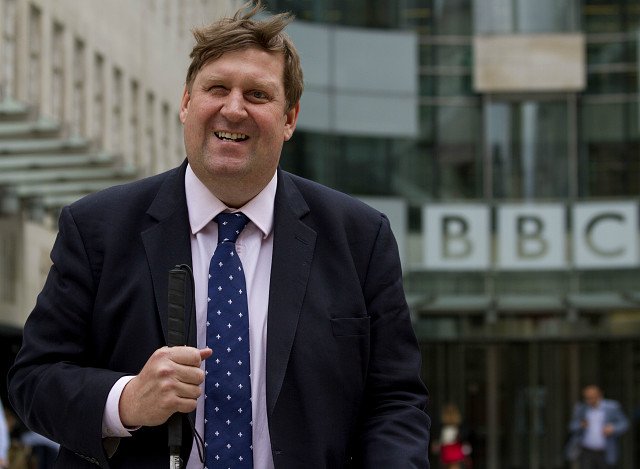Gary O’Donoghue is one of the most inspiring figures in modern journalism. As a BBC News political and Washington correspondent, he has defied all odds to rise to the top of one of the most competitive industries in the world all while living without sight. His story is not only about overcoming disability but also about perseverance, excellence, and an unwavering commitment to truth and storytelling.
Born with a visual impairment that eventually led to total blindness, Gary O’Donoghue’s journey to becoming one of the most respected journalists in the BBC is a testament to resilience, skill, and passion for journalism. This article explores his early life, education, professional career, challenges, and achievements providing a complete look into the inspiring life of the BBC’s blind reporter.
Early Life and Background
Gary O’Donoghue was born in England in 1969, in a world that often underestimated the abilities of people with disabilities. His father worked as a semi-professional musician, and his mother was a teacher, both encouraging him to pursue his interests and ambitions from a young age.
Gary was partially sighted at birth due to a congenital condition. However, he lost his sight completely by the age of eight. Despite this challenge, Gary showed remarkable determination and independence even as a child. His early life was not defined by blindness rather, it was defined by his drive to learn, adapt, and thrive.
Education Building a Foundation for Success
Gary O’Donoghue attended Worcester College for the Blind (now known as New College Worcester), a specialist school for visually impaired students. Here, he developed a love for literature, debate, and public speaking skills that would later serve him well in journalism.
After excelling in his studies, Gary earned a place at Oxford University, one of the world’s most prestigious institutions. He studied Philosophy and Modern Languages, demonstrating his intellectual curiosity and determination to compete on equal terms with his sighted peers.
At Oxford, Gary’s quick wit, analytical mind, and passion for storytelling began to flourish. His time there also instilled in him a belief that disability should never be a barrier to achieving greatness.
The Journey into Journalism
After graduating from Oxford, Gary O’Donoghue joined the BBC as a trainee reporter in the late 1980s. It was a time when accessibility in media was far from what it is today, but Gary broke through every barrier with his professionalism and talent.
He began his career in radio journalism, where his eloquence, confidence, and deep understanding of political and social issues stood out. Working for BBC Radio 4, he covered a range of stories from local politics to major global events. His storytelling was grounded in fairness, depth, and empathy qualities that would define his career.
Gary quickly earned the respect of his colleagues for his ability to interpret complex political developments and convey them clearly to the public. His blindness never hindered his work; in fact, his unique perspective often gave him a deeper sensitivity to the human aspects of the stories he covered.
Breaking Barriers at the BBC
Gary O’Donoghue’s rise through the BBC ranks is a story of resilience and trailblazing achievement. He went on to become a political correspondent based in Westminster, covering UK politics, elections, and government affairs for years.
His professionalism and accuracy made him a trusted voice among BBC audiences. Over time, Gary’s role expanded he reported on some of the most critical moments in British and international politics.
However, his career was not without challenges. In 2007, Gary faced one of the toughest moments of his professional life when the BBC settled a legal dispute with him after he was replaced on a major political assignment because of his blindness. The incident sparked a broader conversation about disability discrimination within media organizations.
But true to his resilient nature, Gary did not allow the setback to define him. Instead, he used the experience as motivation to continue excelling not as a “blind journalist,” but as a journalist who happens to be blind.
Transition to the United States
In 2014, Gary O’Donoghue was appointed as the BBC News Washington Correspondent, a role that placed him at the heart of American politics and global affairs. From the White House to Capitol Hill, Gary began reporting on major U.S. political developments with the same sharp insight and clarity that had defined his earlier work.
As a Washington correspondent, he has covered U.S. presidential elections, Supreme Court rulings, international summits, and social movements. His ability to analyze and explain complex issues from policy debates to global crises continues to make him one of the BBC’s most respected international journalists.
Gary’s reporting is characterized by a calm, authoritative tone and a commitment to factual integrity. He’s known for his thoughtful interviews, precise language, and the ability to convey balance even in polarized political climates.
Adapting to the Challenges of Blindness
Gary O’Donoghue’s success in journalism is remarkable not because he is blind, but because he has achieved excellence in a field that relies heavily on observation and on-the-ground presence. His ability to adapt technology and techniques to perform at the highest level is a model of ingenuity.
He uses assistive technology, such as screen readers and specialized software, to access information, write scripts, and research stories. He also works with a skilled team of camera operators and producers who ensure his visual coverage matches his editorial vision.
Gary often emphasizes that teamwork and communication are vital. His blindness, rather than a limitation, has taught him to listen more closely, notice subtleties in speech and tone, and connect deeply with the people he interviews.
Advocacy and Inspiration
Beyond his professional success, Gary O’Donoghue has become a symbol of inspiration and advocacy for people with disabilities. He often speaks about the importance of inclusion, accessibility, and equal opportunity in the workplace.
He has mentored young journalists with disabilities and has been a strong advocate for making newsrooms more inclusive. His message is clear: disability should never determine potential or limit ambition.
In various interviews and public appearances, Gary has shared how he navigates challenges with humor, determination, and optimism. His perspective encourages others to focus on ability, not limitation.

Personal Life
Gary O’Donoghue lives a balanced life between his professional commitments and personal passions. He is married to Helen, who also works in journalism, and together they share a love for news, storytelling, and travel.
Outside work, Gary enjoys music, literature, and sports. He has been an active participant in blind cricket, representing England in international competitions proving once again that blindness has never stopped him from living life fully.
Awards and Recognition
Over his decades-long career, Gary O’Donoghue BBC has received numerous accolades for his contribution to journalism and disability representation. His work has inspired countless people both inside and outside the media industry.
Some of his notable recognitions include:
- BBC’s Diversity and Inclusion recognition awards for his contribution to accessible journalism
- Recognition by disability advocacy groups for promoting visibility and empowerment in the media
- Speaking engagements and university honors, highlighting his influence as a role model and public figure
Through these achievements, Gary continues to pave the way for a more inclusive and diverse media landscape.
Gary O’Donoghue’s Legacy
Gary O’Donoghue’s story is one of courage, talent, and transformation. He has proven that journalism is not about sight it’s about insight. His ability to challenge stereotypes and achieve excellence on a global stage serves as an enduring lesson for generations to come.
In a world still struggling with accessibility and inclusion, Gary’s journey reminds us that disability does not define destiny. What defines it is determination, skill, and heart qualities that Gary embodies in abundance.
His biography continues to inspire not only aspiring journalists but anyone facing adversity. Whether reporting from Westminster or Washington, Gary O’Donoghue stands as a beacon of resilience and professionalism.
Conclusion
Gary O’Donoghue’s biography is more than the story of a journalist it’s the story of human potential. From losing his sight as a child to becoming one of the BBC’s most respected correspondents, Gary has redefined what it means to succeed in journalism.
His life teaches us that barriers exist only until we challenge them. Through persistence, innovation, and integrity, Gary O’Donoghue has not only built a remarkable career but also helped make journalism more inclusive and representative.







